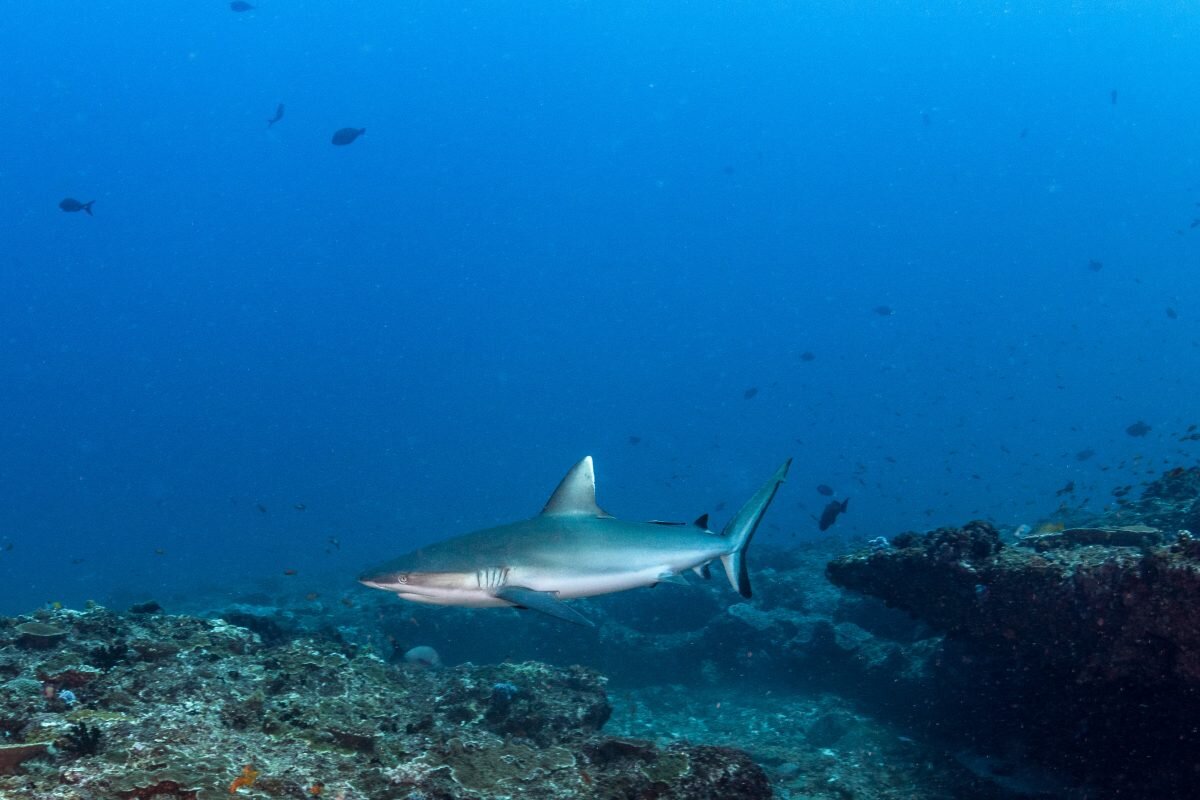Wealthier Nations Host Healthier Reef Shark Populations Amid Sharp Declines
Study Highlights the Power of Strong Resource Management in Mitigating Shark Population Declines
Mozambique white tip reef shark. Photo: Anna Flam
Key points of the Study:
The Global FinPrint project led a landmark study on coral reef sharks that reveals a 60 to 73% decline in once-common reef shark species globally.
Human activities such as overfishing, destructive fishing practices, and climate change are key drivers of the decline.
High-income countries with strong resource management host healthier shark populations.
Marine Protected Areas (MPAs) with rigorous enforcement provide crucial habitats for these sharks.
The potential for recovery is high with coordinated global management strategies and reduced fishing pressure.
Landmark Global Collaboration
Overfishing is pushing reef sharks closer to the brink of extinction than previous estimates predicted, says a comprehensive study titled “Widespread diversity deficits of coral reef sharks and rays” published in Science.
It paints a troubling picture for the five major species inhabiting coral reefs — grey reef, blacktip reef, whitetip reef, nurse, and Caribbean reef sharks, which have seen a global population decrease of about 63%.
The study is an outcome of the Global FinPrint project, an endeavor backed by the Paul G. Allen Family Foundation. This extensive international collaboration aims to lift the veil on the mysterious lives of sharks within the world's coral reefs.
Co-founder of the Marine Megafauna Foundation (MMF) Dr. Andrea Marshall, Mozambique Research Manager Anna Flam, and Researcher Alex Watts co-authored the study and provided invaluable fieldwork from Mozambique.
"This study reveals a crisis far worse than anticipated," says Flam, one of the over 150 researchers from more than 120 institutions involved in Simpfendorfer et al.'s landmark publication.
BRUV Footage from the Global FinPrint Project
Remote Underwater Video Observations
Using Baited Remote Underwater Video Stations (BRUVSs) - akin to underwater camera traps but with the ability to record in high definition - the team accumulated over 20,000 hours of footage from nearly 400 reefs in 67 countries and territories around the world.
"These BRUVSs are essentially our underwater eyes," says Ann Flam from the Marine Megafauna Foundation, a co-author of the study. "They allow us to see what lives off our coastlines in these threatened habitats and observe their behaviors in their natural environments." The BRUVSs were deployed in a variety of reef habitats, providing a comprehensive view of these ecosystems.
Mozambique white tip reef shark. Photo: Anna Flam
Wealthy Nations Linked To Healthier Shark Populations
The study also highlights resilience in the face of this alarming decline. Well-enforced Marine Protected Areas (MPAs) emerged as vital sanctuaries for the threatened reef sharks. "Effective protection and sound management practices can help the recovery of shark populations," Flam emphasized.
Results showed that shark populations thrived in areas with strong resource management and robust enforcement of MPAs, emphasizing the correlation between human socio-economic factors and the health of marine ecosystems.
Dr Marshall says that in Mozambique, “MMF is working with management in the Bazaruto Archipelago and the Sanctuary, encouraging participatory action with local communities in areas lacking national level protection.”
“Source” Populations Can Aid Recovery
The concept of "source" populations was also recognized - reefs with robust shark populations that could potentially replenish overfished neighboring areas. "Effective management on one reef can protect local species even if neighboring reefs face collapse," Flam explains.
The drastic decline of these reef sharks is not merely an ecological concern. The potential ripple effects on human food security and livelihoods are significant, given the essential role sharks play in maintaining healthy marine ecosystems. The study thus underscores the urgency of globally coordinated efforts to halt this decline and promote recovery.
The data gathered through this study had previously been instrumental in updating the status of four of these species to more threatened categories on the International Union for the Conservation of Natures (IUCN) Red List. It also contributed to policy decisions at the recent Conference of the Parties of the Convention on the International Trade in Endangered Species of Wild Fauna and Flora (CITES) to better regulate trade in sharks.
The full study, “Widespread diversity deficits of coral reef sharks and rays”, is available at: https://www.science.org/doi/10.1126/science.ade4884
For questions about this press release, please contact:
Anna Flam
Research Manager (Moazambique), Marine Megafauna Foundation
anna@marinemegafauna.org
About Global FinPrint
Global FinPrint is an initiative of the Paul G. Allen Family Foundation and led by Florida International University, supported by a global coalition of partner organizations spanning researchers, funders and conservation groups. The project represents the single largest and most comprehensive data-collection and analysis program of the world’s populations of reef-associated sharks and rays ever compiled.
About the Marine Megafauna Foundation
The Marine Megafauna Foundation (MMF) is a registered 501(c)(3) non-profit conservation organization based in the USA. Established in 2009, MMF's mission is to research, protect, and conserve the populations of threatened marine megafauna worldwide. Headquartered in Palm Beach, Florida, MMF focuses on large marine species, such as sharks, rays, and sea turtles, collectively known as 'megafauna'. For further details, please visit www.marinemegafauna.org or follow us on Twitter, Facebook, Instagram, and LinkedIn.







A new study has shown that the massive 12ft wide sicklefin devil ray (Mobula tarapacana) is present off the US Atlantic coast. Listed as Endangered by the IUCN, this is the first time these huge, elusive rays have been documented in the eastern US.